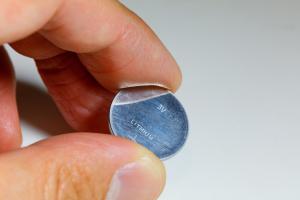Dangers of button cell batteries
Date published:

Lithium batteries can be fatal
Make sure any toys bought for Christmas are appropriate for the age of the child.
The festive period can see a rise in the number of small, button-shaped lithium cell batteries in the home.
They are in electronic items, including:
- toys
- musical Christmas cards
- remote controls
Sometimes young children's first instinct is to put things in their mouths.
Button cell batteries can do serious damage if swallowed, including:
- choking
- burning
or
- poisoning
Lithium batteries react with saliva, creating an electrical current. This leads to a build-up of caustic soda, which will burn through the oesophagus and major blood vessels.
This can cause serious, life-changing injury and if not caught in time, can be fatal.
You can see the damage they can do in the video at this link:
How to protect young children
To help protect young children from the dangers of button cell batteries:
- do not use toys that don’t have lockable battery compartments
- check lockable battery compartments to make sure they are:
- secure
undamaged
and
- can’t be opened or broken easily
- take care when changing batteries to make sure the compartment is locked after and the old battery is disposed of safely
- keep spare batteries in a safe place out of reach of children
Treat these batteries the same way you would any poisonous substance – out of reach and out of sight.
It's also important in general to:
- follow manufacturer guidelines
- use your own judgement to pick toys that are appropriate for the age and ability of the child
Seek medical help
If you think your child has swallowed a button battery, seek medical help immediately.
Choosing a toy
Some children, particularly those under three, are more vulnerable to choking and are less able to cope with some toys than older children.
Therefore, it is important to buy age-appropriate toys.
You should also think about the ability and needs of the child.
If you think a toy is risky, avoid buying it.